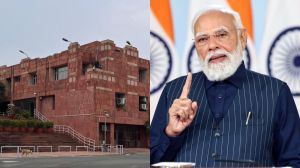Making sense out of cynicism
Parliamentary debates may be exercises in boredom, but they help showcase the value systems of both political parties and politicians. In...

Parliamentary debates may be exercises in boredom, but they help showcase the value systems of both political parties and politicians. In the recent debate which saw the defeat of the Vajpayee government, the one cause that parties across the spectrum seemed to recognise as a worthy one was that of secularism. Indeed, secularism drew the battlelines of this debate, as it did the debate of May 1996, which marked the end of Vajpayee8217;s 13-day rule and that of May 1997, which saw H.D. Deve Gowda8217;s exit as prime minister.
This time, while the leader of the Opposition Sharad Pawar attacked the BJP-led government for 8220;damaging the social harmony of the nation8221; and of practising the 8220;politics of hatred8221;, his party colleague P. Shiv Shankar cited the recent Report of the Citizen8217;s Commission on persecution of Christians in Gujarat to buttress his argument that the Vajpayee government had presided over a vicious anti-minority campaign. CPI veteran Indrajit Gupta accused the ruling coalition of functioning underthe pressure of the Sangh Parivar. He cited three instances 8212; the increasing attacks on minorities, the VHP campaign to go ahead with its plan to build a temple at Ayodhya and the home minister8217;s attempt to exonerate the Bajrang Dal of involvement in the murder of Graham Staines and his two sons in Orissa 8212; as conclusive proof of this.
The BJP and its allies laboured equally hard to dispel the notion that they were in any way anti-secular in character. While L.K. Advani claimed that 1998 was a riot-free year and dismissed the attacks on Christians as part of a conspiracy to defame the BJP, his combative cabinet colleague George Fernandes stoutly defended the Vajpayee rule by maintaining that the maximum attacks on Christians had taken place in Congress-governed states.
But most of this was bluster. The contradictions between what politicians say and what they do constantly surface. Take the recent attempt to form what was termed as the 8220;secular alternative8221; to the BJP-led coalition. There was Dr J.Jayalalitha, general secretary of the AIADMK, suddenly appearing on the political stage in the garb of the angel of secularism. Wasn8217;t it just the other day that she helped mainstream the BJP and its Hindutva agenda in a state where the party had no presence, by virtue of joining hands with it? With what credibility can she, or her ally Subramanian Swamy, now claim an undying commitment to the secular cause?
Her arch foe fared no better in the secular sweepstakes. When Jayalalitha made common cause with the BJP before the 1998 Lok Sabha elections, Tamil Nadu chief minister M. Karunanidhi had acidly remarked that corruption had joined hands with communalism. The moment Jayalalitha moved away, Karunanidhi discovered th-at 8220;corruption was worse than communalism8221; and quickly sk-ipped across to the BJP. Communalism was, by implication, an acceptable evil to this champion of secularism.
As for that veritable champion of champions of secularism, Mulayam Singh Yadav, he is presently preoccupied with flashinghis secular credentials by charging the Congress for having betrayed the 8220;secular cause.8221; Through such rearguard action he hopes to dodge the charge that he had let down his secular allies by not supporting the proposed Congress minority government. It is without doubt Mulayam8217;s anxiety to prevent the disintegration of his Muslim vote base that lends a touching urgency to his secular campaign.
Mulayam8217;s statements may smack of hypocrisy but the Congress, much as it would like to emerge as secularism8217;s greatest votary, has had its own share of doublespeak, its own brand of wink-and-nudge politics dictated by such exigencies as cultivating the upper-caste vote. Its Working Committee last year recognised Hinduism 8220;as the most effective guarantor of secularism8221; 8212; a formulation that is just a variation on the one Advani recently spelt out when he held that Hindutva is the most effective guarantor of secularism.
What is the citizen to surmise from all this? What is it about the term 8220;secular8221; 8212; which isgenerally understood as the separation of religion from politics 8212; that elicits the most cynical responses? The fact is that secularism has come to be widely recognised as a social good. Despite concerted attempts of political parties to cynically carve out religion-based constituencies, there is today a general understanding that secularism is a precondition for India remaining a democratic state representing a diverse people.
What8217;s more, secularism has acquired electoral currency; it8217;s a value that the Indian voter recognises and responds to. There is no denying the fact that Vajpayee8217;s popularity is premised on his secular rhetoric. This, after all, is the man who stood up in the Lok Sabha in May 1997, as the debate on Deve Gowda8217;s confidence vote was in progress, and declared that nobody could change the secular fabric of the country. 8220;India was secular, India is secular and India will remain secular,8221; he had thundered.
It is precisely because Vajpayee can pronounce words of this kind in a mannerthat appears more convincing than, say, if it had been L.K. Advani mouthing them, that made for his acceptability as a prime ministerial candidate. This is also why Vajpayee, throughout his 13 months as prime minister, had to constantly negotiate his way between two opposing poles: his commitments as a member of his party and those dictated by his role as a 8220;secular8221; prime minister.
While he paid obeisance to the religious agenda of the Sangh Parivar by calling for a debate on conversions, for instance, he followed it up by going on a fast on January 30, Gandhiji8217;s martyrdom day, to atone for the 8220;sectarian violence8221; that the country had witnessed in December and January. Just as the conversion statement was meant to placate hardliners within the Sangh Parivar who had attributed the party defeats in the November assembly polls to Vajpayee8217;s dilution of the Hindutva agenda, this was a gesture designed to assuage a liberal public disturbed by the attacks on minorities and the Staines murders.
The word8220;secular8221; then is on every politician8217;s lips, but never has it been so cynically used, so systematically robbed of meaning, as it is now. There seems to be a deliberate attempt to obfuscate and distort it to suit the power struggles of the day. It8217;s only when voters begin to separate the rhetoric from the reality and perceive the cynical power games that are being played, will we even begin to make our first tentative moves towards a genuinely secular politics.
- 01
- 02
- 03
- 04
- 05































